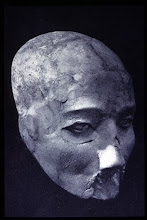The media has been taking serious hits recently for their reluctance to, well, call a pig a pig. They have an ethical responsibility to the public to expose McCain lies for what they are, the argument goes, and instead they are hiding behind the old canard of "journalistic objectivity." As if that's even relevant in the age of narrowcasting...
Boy do I ever feel their pain.
One of rhetoric's cornerstone concepts I stress to my students is that of "dissoi logoi," that there are (at least) two sides to every argument. Knowing and being able to argue both sides doesn't make you a flack without a conscience, a la Nick Naylor in "Thank You for Smoking," but rather a more thoughtful and reflective advocate who has crafted your position carefully instead of relying on ideological "talking points."
This approach necessitates a certain amount of political agnosticism in class if I am to be seen as an honest broker. Students, if they smell your own personal tendencies, will tend to attempt to conform to your perceived biases. They're not being BAD, they're simply trying to adapt to their audience (this adaptation does not always go well, and my willingness to play devil's advocate has occasionally created head-scratching results, as when a student once asked a colleague of mine if he thought I would be all right listening to a speech supporting stem-cell research. I nearly choked on my morning coffee). This isn't a class about persuading Professor Rhetoric. I am not the point.
I'm pretty uncomfortable about this position, theoretically speaking. Objectivity is a myth; even our scientific pursuits are to an extent shaped by our desires regarding what the world should be and what it is. Yet, it is a helpful ideal. It provides us with a goal or principle, to be fair-minded and dispassionate, to build connections of empathy even with those on the other sides of our various political fences, and to learn what it means to "respectfully disagree."
The recent fabrication-happy McCain advertizing campaign is pushing against my resolution to remain an honest broker standing at the head of the class. It's not that there's anything partisan about calling out lies when one sees them (indeed, this would provide a very important object lesson as to how rhetoric can be used deceptively), it's that I will be perceived as such. Nothing ruins class dynamics faster than the fear that the professor has an agenda. It tanks my trustworthiness and credibility, and in education as well as in journalism, trustworthiness and credibility are critical.
I don't have an answer yet that I feel comfortable with. Hopefully I'll work something out before November. But until then--Charlie Gibson, I know what you're going through...
Next time, political framing: Lakoff, identification and praising Sparta in Athens.
Sunday, September 14, 2008
Subscribe to:
Post Comments (Atom)

No comments:
Post a Comment